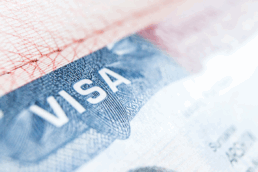The H-1B is designated for individuals who work in a “specialty occupation.” This term has been defined by Citizenship & Immigration Services (“CIS”) as a position that requires both the theoretical and practical application of a body of highly specialized knowledge and traditionally requires a Bachelor’s degree.
H-1B status is granted for an initial period of three years and can be extended for an additional period of three years for a total of six. Exceptions may apply depending on an individual’s immigration circumstances. Filing fees can range from $1,525 to $2,575 and additional government fees may be incurred if the applicant requires a nonimmigrant visa. Payment of these fees may be negotiable between employer and employee; however the certain fees must always be paid by the employer.
The H-1B visa category is subject to an annual numerical limitation, referred to as the “cap.” The cap is set to 65,000 for fiscal year 2013 which begins on October 1, 2012 and there is an additional 20,000 allotted for those with Master’s degrees. CIS began accepting new, cap-subject H-1B petitions on Monday, April 2, 2012. While it is impossible to predict how quickly the cap will be reached, there have been years when it has been filled in as quickly as a few days. Therefore, it is best to gauge personnel needs and file as early as possible. Certain employers are “cap exempt” and the cap does not apply to those individuals currently holding H-1B status who seek to extend their status or change employers.
To demonstrate that an individual qualifies for H-1B status, a petition must be prepared and properly filed which includes a detailed summary of the employer-petitioner, beneficiary’s qualifications, and comprehensive supporting documentation. Additionally, before a petition can be filed, there are several time-sensitive requirements which must be completed. Employers must submit a Labor Condition Application (“LCA”) with the Department of Labor’s iCERT system which in turn verifies their Federal Employer Identification number (“FEIN”). This process takes approximately two to four business days. The LCA must then be filed for the proffered position. Certification of an LCA can take up to seven business days. It is important to plan ahead, as H-1B petition preparation can often take at least two to three weeks.
CIS may conduct unannounced worksite visits which are conducted through their office of Fraud Detection and National Security (“FDNS”). These audits are conducted to verify basic facts relevant to the H-1B petition as filed. In 2010, approximately 25,000 worksite visits were conducted. It is imperative that employers maintain complete and accurate Public Access Files for all H-1B employees, ensure that there is an I-9 on file for every employee, enroll in DHS’s E-Verify program, and have a designated “go to” person in the event of an unexpected site visit.
It should be noted that the beneficiaries of approved H-1B petitions cannot begin work until October 1st. Since there may be up to a six-month “gap” between the time of filing and employment eligibility, it is important to plan ahead with respect to resources, maintenance of status in the U.S. and work authorization.
Ready to have Berardi on your side?
Whether you’re a business looking to hire or a professional hoping to relocate, immigration law can be complicated. But you don’t have to do it alone. Put our experience to work for you.


